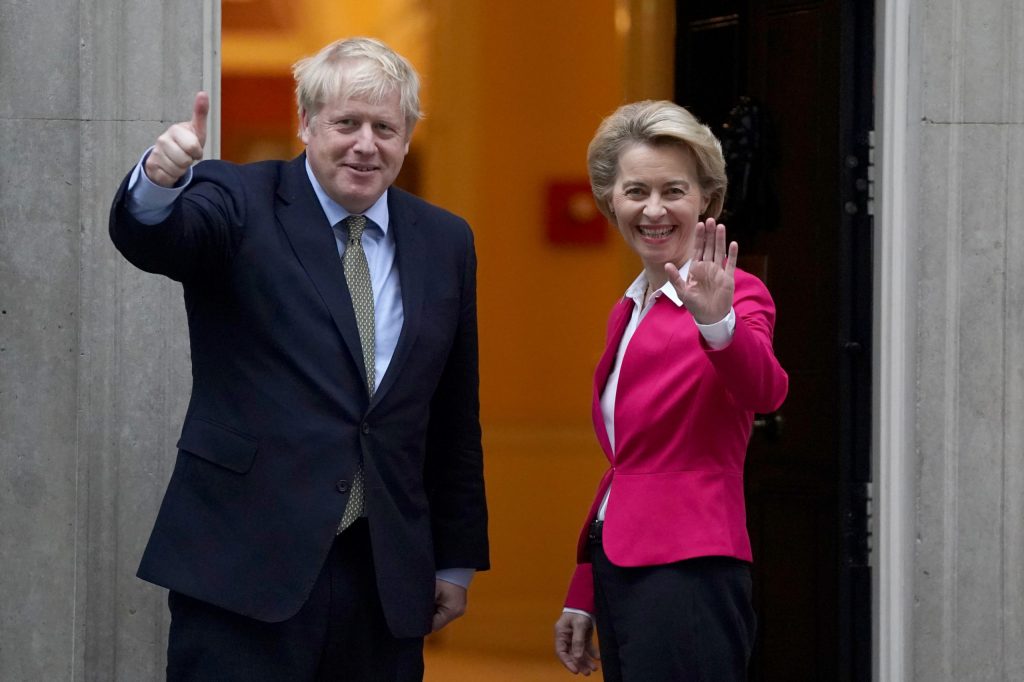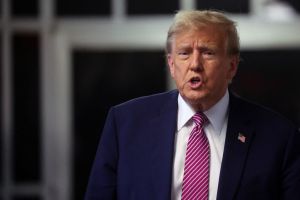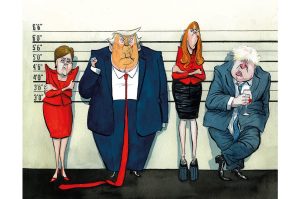For the first time since the referendum, the United Kingdom has a strong government that knows what it wants from Brexit. This will make the second round of the negotiations with the EU very different from the first.
Theresa May famously declared, and repeated, that ‘Brexit means Brexit’. This was a soundbite designed to conceal fundamental differences within her cabinet about what it did actually mean. They were never resolved. Many in her cabinet, and especially the Brexiteers, thought that Brexit must mean fully leaving the customs union and the single market. But Philip Hammond, her Chancellor, and Greg Clark, the Business Secretary, thought that it was essential to avoid ‘friction’ at the border and so rallied other Remain colleagues against this approach. The absurd consequence was that 27 EU governments ended up more united on Brexit than the British cabinet. As one Brexit veteran concedes, ‘The EU attack that we weren’t clear what we wanted had a quite lot of truth to it, as we never resolved the friction question.’
Now, the government knows what it wants: to break free from EU rules and regulations and chart its own course. This was made clear in Monday’s meeting of the cabinet’s Brexit strategy committee. There is the understanding that this will not mean things carrying on as before. The government accepts that trade will not flow as seamlessly across the Channel after Brexit. ‘There is going to be some friction,’ says one senior figure.
The prime minister has been impressing on colleagues that the whole point of leaving the EU was to regain the freedom to do things differently, so any Brexit deal without that would be pointless. I am told that there is ‘no way’ the government will go for a high alignment model to prevent friction at the border. If we have heard little about the advantages (i.e. the point) of Brexit, that’s because, under May, government departments learned to say little or nothing about the potential upsides. They worried that these upsides might not end up existing: why trumpet how leaving the EU will allow you to do something if the eventual trade deal required compromise on that point? But the word has now gone forth from Downing Street that departments should look at opportunities, and not worry about pre-empting the negotiations. A crucial shift has taken place. As one cabinet minister says, the government is now ‘more open to exploring the opportunities of divergence than the constraints of alignment’.
Even the Treasury is coming on board. I understand that Sajid Javid, the chancellor, has successfully argued for heavy Treasury involvement in the analysis of the future trade deal with the EU. Normally, this would set Brexiteer alarm bells ringing: the institutional Treasury is wedded to the status quo when it comes to EU trade. But the Treasury is under new management and Javid is cooperating with No. 10. Since the election, Javid has been busy trying to reassure the prime minister that he and the Treasury are determined both to get Brexit done and to deliver on Johnson’s ‘leveling up’ agenda. There has been talk in No. 10 of creating an Economic Affairs department to rival the Treasury in several important regards and Javid is keen to show that there is no need for a new department, or a new chancellor.
Some allies of the prime minister are unimpressed with Javid. They suspect he was trying to build cabinet support for clipping No. 10’s wings if the Conservative majority had been less than expected. The PM, however, appears resolved to keep his former leadership rival in place.
In some quarters of the City, there is excited chatter that the election result will lead to a softer Brexit. A majority of 80 means the government could withstand even a pretty big rebellion from the so-called Spartans, the Tory Brexit-ultras. But this sort of analysis assumes that the prime minister is itching to renege on his various Brexit promises now that he’s safely in No. 10. In fact, he is serious about the benefits of taking back control. It is, after all, the reason why he backed leaving in the first place.
The EU keeps misjudging him on this point: there was shock in Brussels when he ruled out any extension to the tight Brexit deadline. The determination to wrap things up by December 31 has consequences. It is not realistic to have a deal ratified by national parliaments by then, so the new Brexit deal needs to be within the Commission’s competence — and not require ratification by national parliaments in advance. David Frost, the PM’s trusted Europe adviser, who will run the negotiations, is currently assessing what limitations that places on things. In crude terms, though, it means that the deal will be far more focused on goods — where the EU has a large trade surplus with the UK — than services, where the UK has a surplus. ‘It won’t be an all-singing, all-dancing free-trade agreement,’ cautions one government figure.
The tight Brexit deadline will be met but, crucially, not all of the Brexit deal needs to be agreed by then. ‘We can do this in stages,’ says one cabinet source. ‘That will kill any talk of a cliff edge.’ Therefore if talks fail, then this does not mean ‘crashing out’ as it once might have done. The new Irish protocol deals with the border situation there. There is also agreement on EU citizens’ rights. The financial settlement means that the two sides should avoid the most acrimonious outcome. The plan is to complete a rough Brexit agreement by June and then to spend the next few months turning that into legal text — and agree other aspects as the talks progress, reducing the size of any December cliff edge.
This, anyway, is the British plan. What the EU makes of it is another matter. Its view is that the UK’s size and proximity means that even a Canada-style free-trade deal would require stringent ‘level playing field provisions’ — i.e. demands that Britain adheres to various EU rules. On her trip to London this week, the new Commission president Ursula von der Leyen was keen to stress that she wanted a deal with no tariffs, no quotas and no dumping. ‘Dumping’ is Brussels’ code for other countries not agreeing to follow EU rules on social and environmental rights. Brussels also keeps stressing that an agreement to align with EU standards is the quickest way to speed negotiations along. But it is worth remembering that Johnson resigned as Foreign Secretary over May’s Chequers plan because he objected to how it would leave the UK following too many of these rules. ‘If Brexit is to mean anything,’ he said in his resignation letter, ‘it must surely give Ministers and Parliament the chance to do things differently.’ The example he gave was about changing lorry cabins’ heights in the UK to better protect cyclists. The same principle applies to issues from medical trials to public procurement. In his meeting with von der Leyen, Johnson was keen to stress that the future partnership ‘must not involve any kind of alignment or [European Court of Justice] jurisdiction’.
There might be an early test of the UK’s resolve. The EU has been talking as if it will try to repeat the technique used to put May on the rack: ‘sequencing’ talks, so the UK has to agree one set of issues before the EU moves to another set. Brussels sources have suggested that the first phase of talks will include only goods and fishing (the French, Danish and Dutch are keen on access to British waters). I’m told that the UK will simply reject this approach.
If necessary, Britain will walk away rather than carry on talking in these circumstances. Senior Downing Street figures are adamant that the Brexit deal negotiated with the EU last October would have been far better for Britain if parliament had not blocked its ability to leave the table. They reckon that a threat to walk away now (especially if there is a US deal on the table) will make the EU more inclined to compromise. Johnson’s allies think the UK is likelier to get a good deal if he has lined up (and is willing to take) a rival offer from Washington as Brussels will not want to risk the UK leaving the EU’s regulatory orbit and joining the US one.
Then comes security. Diplomatic and military alliances have nothing to do with free-trade agreements — which is why May sought no Brexit favors from Macron when she agreed to deploy RAF helicopters to help French efforts in the Sahel in 2018. But those around Johnson consider this a missed opportunity and want to underline that a good deal with Britain can lead to wider benefits. Once a basic trade deal is signed, they want there to be plenty of reasons for the EU and UK to keep negotiating and to stay close.
A few months ago, when Europe was steeling itself for a no-deal Brexit, Merkel’s main concern was seeing Britain come loose from Europe’s diplomatic ties. Macron is as keen as Merkel to maintain cooperation with the UK on security issues: he doesn’t want France having to take on the burden as the one major military player in Europe. Since becoming prime minister, Johnson has managed to keep strong relations with Donald Trump while staying European on many international issues. I am told that the E3 — the UK, France and Germany — will intensify their joint diplomacy on Iran and the Middle East in the coming weeks.
This year is a moment of truth for the Brexit project. The prime minister is the man who led the Leave campaign, he has a majority in parliament and many of his Vote Leave allies in key positions in government. They have every chance of success, but no one else to blame if this ends in failure. They must show that the UK can take back control and prosper.
This article was originally published in The Spectator’s UK magazine. Subscribe to the US edition here.



















